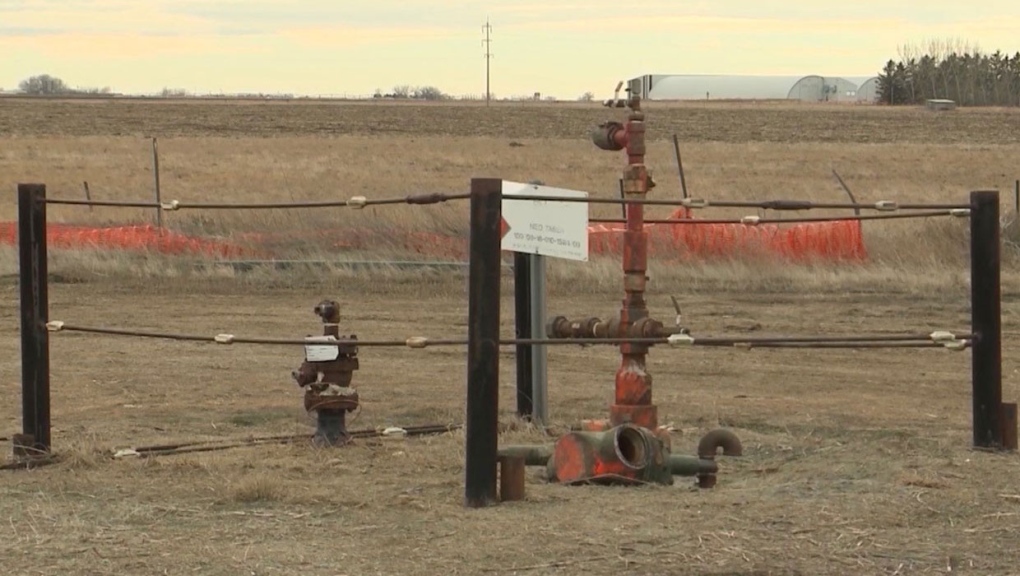'Corporate welfare and misguided': Criticism continues about Alberta's proposed oil well cleanup incentive
There are continuing questions about a provincial government proposal to give oil companies breaks on royalty rates if they clean up old inactive wells.
Alberta has launched engagement on a pilot project called the Liability Management Incentive Program, which would provide up to $100 million in credits over three years to companies that clean up sites that have been inactive for at least 20 years.
Premier Danielle Smith said last week that the government needs to try a different approach to reclamation of the wells. Provincial documents outlining the program say the project would "further encourage exploration and production, spurring jobs and economic investment."
Companies are already liable for safely closing up and cleaning well sites and opponents to the plan say that's who should be on the hook for costs.
"Why would we take the obligation away from the producers? The people that, when they started the oil and gas production, they knew full well that cleanup was part of the obligation?" said Drew Barnes, an independent MLA who used to be part of the United Conservative Party caucus.
Barnes characterized the pilot program as "corporate welfare and misguided."
Danielle Smith, before becoming premier, lobbied the province on an incentive-based cleanup program known as RStar. Sonya Savage, who was Alberta's energy minister at the time, admitted Monday that she was not in favour of the program then.
"I did indicate that the RStar, as it was proposed at that time, didn't align with Alberta's polluter-pay principle and the royalty framework," Savage said about her June 2021 response.
"With respect to the pilot program that's being looked at by Energy, I think you'd have to direct those questions to them," she said.
It's an issue that is likely to be much talked about in the lead up to May's provincial election, according to political scientist Trevor Harrison.
"Most Albertans will say 'yes, we know it needs to be cleaned up, but why is it coming off my dime?'," Harrison said.
"Why is that companies that are very much flush with cash at this point... why are they not chipping in to do this, because this was their responsibility?"

The government document outlining the pilot lists eligibility criteria for the program, such as well sites needing to be drilled prior to 1980, and says it will be "applied to all well sites in the province and the orphan well site inventory."
An orphan well is a site that does not have a legal owner because the company has either gone bankrupt or no longer exists.
It's unclear how the proposed incentive program would apply to orphan wells if the sites have no legal owner. Repeated questions to the province's energy ministry were not answered, with a spokesperson saying the pilot program has not been finalized yet.
"Well, in my view, it's against the law," said Mark Dorin, the director of Polluter Pay Federation.
"The laws of Alberta are that the polluter alone cleans up and that you compensate the landowner until the site is restored to its condition and returned back to the landowner."
A provincial spokesperson would not say what the timeline is for the program's engagement or when it will be finalized.
CTVNews.ca Top Stories

Poilievre says it would be 'not fair' for Liberals to replace Trudeau as leader
Conservative Leader Pierre Poilievre thinks it would be 'not fair' for the Liberals to oust Prime Minister Justin Trudeau now, as in his view they are 'morally obligated' to keep him.
An expert stands firm on his U.S. election win prediction. Here's what he says happened after
An American presidential historian is maintaining his previous prediction of a Kamala Harris presidency as the U.S. election hits the one-week mark.
Missing B.C. teenager Jodi Henrickson at centre of upcoming documentary
Henrickson was a 17-year-old girl from Squamish who went missing after a house party on Bowen Island, during the then unusually warm summer of 2009.
'I'm ready for an election': Bloc beginning talks to topple Trudeau gov't as ultimatum expires
Bloc Leader Yves-Francois Blanchet is starting to talk to other opposition parties about bringing down Prime Minister Justin Trudeau's minority Liberal government.
Nova Scotia lifts stop-work order at Halifax Walmart one week after body of teen found in oven
Nova Scotia’s Department of Labour has lifted its stop-work order at a Halifax Walmart more than a week after the body of 19-year-old Gursimran Kaur was discovered in an industrial oven in the store’s bakery.
N.S. teen charged for allegedly making threats to school
A Nova Scotia teen is facing numerous charges related to a complex swatting investigation. On Oct. 25, Nova Scotia RCMP, with the assistance of the Ontario Provincial Police, arrested a 14-year-old male at his home in Bridgewater, N.S.
Senior Modi cabinet minister linked to India-supported violence in Canada: officials
Prime Minister Justin Trudeau's Deputy Foreign Affairs Minister David Morrison has confirmed a report that Canada is alleging an Indian cabinet minister and close adviser to Prime Minister Narendra Modi ordered intelligence-gathering operations of Canadians.
Plant-based milks facility did not follow listeria prevention protocol: CFIA
The Canadian Food Inspection Agency says an Ontario facility producing plant-based milks was not adhering to Health Canada’s policies on listeria prevention prior to an outbreak that led to three deaths.
Special interlocutor calls for 20-year probe into missing Indigenous children
A final report into missing children and unmarked graves at residential schools is calling on the federal government to create an Indigenous-led national commission with a 20-year mandate to investigate missing and disappeared Indigenous children.

































